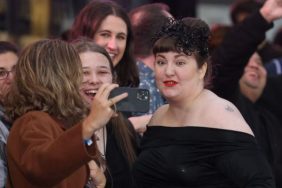
CraveOnline: In this version Chris and Billy seem very aware of the consequences of dropping pig’s blood on Carrie. They know that it’s a crime. At one point Chris almost seems to be doubtful about it.
Brian De Palma: I’m glad that you picked up on that. It was important to me in looking at the Chris and Carrie duel that, basically, Chris is used to being the queen bee, used to having all the power, used to having her boyfriend follow her around, used to having all the girls following her. So on this day, things started to change. She makes fun of Carrie as she always would, but this time her best friend starts to admonish her and say, “Wait, we really shouldn’t do that, we should be nice to Carrie.” She sees her teachers take up Carrie’s cause. She [sees] her father and her principal take up Carrie’s cause. I didn’t think that you could have her throw those tampons and then cut to a number of scenes later, she’s dumping pig’s blood.
I really wanted Chris to be a real person, so I make her a vulnerable girl. You pointed out the relationship with the father. Every time somebody takes care of Carrie, Chris feels like she’s losing ground and it makes her pissed. It makes her want to retaliate, and so that’s why I think [it feels] like Chris is more grounded. And also I wanted it to be when Chris goes to prom… Did you notice I have a shot in there where she’s watching the prom and watching them dance?
I noticed.
For a moment she’s like, “I should be down there dancing. What am I doing with this guy up in these rafters?” So she’s not only missing out on her prom because she’s a wounded girl that’s thinking, “Did I make a mistake?” But then when he’s laying out the dangers that this could cause, there is a moment where she thinks, “This is a mistake.” And then her true nature takes over which is, at the end of the day, she’s competitive with Carrie. She doesn’t want Carrie to get the power. She wants it back and so she’s going to retaliate.
You also really flesh out Sue’s subplot. I feel like in the De Palma version she’s always a good person.
Right.
In your version she’s learning a valuable lesson the hard way and making tougher choices.
Well that’s great. That was the goal from the beginning, because I looked at it and I said, wow, Sue is underdeveloped. We have to develop the fact that she… She starts, if you noticed, she pushes Carrie away because Carrie touches her shirt. She calls Carrie a freak first. She sets everything in motion and that’s why she has so much guilt, because even Chris says, “We’re not going to tell them who started this.” So she’s feeling guilt, she’s searching for the solution. She doesn’t choose the right solution. She should say, “I’m sorry.” She should befriend Carrie. But as a privileged person she couldn’t be bothered. It’s easier to donate her boyfriend. So she’s doing a good thing but she’s not doing the right thing, and of course she sees what she wreaks and then she wants to try to make good on it.
When Carrie finally unleashes all of her rage, I was struck by the way you directed her movements. She’s very plaintive when she kills people. She’s reaching out to them.
There were two things that were important to me. One is, this is a superhero origin story. So the powers had to be rooted in a reality, and they’re always emanating from her body like emotions. The trigger point, when Tommy goes down, that’s her king. When he falls she bends down. She’s the queen weeping over her king. Her powers first come out out of her control, as a manifestation of grief. It’s only after that that she gets to get angry and track down people who did this. So yes, she is reaching out to them because physically she’s going after the people who did this.
As near as I can tell every adaptation of Carrie seems to skip the epilogue from the book, where it’s seen as this national tragedy. Do you feel like that’s besides the point, and would distract from a story about one girl and her trauma?
No, I think that you can thread the needle very carefully. You can put in a lot of context, you just have to be very careful that you’re serving the audience and that the audience is inside story, and that [when] coming out of it they love Carrie. They’ve been through this tough experience. If you’re going to add that wider context you have to be very gentle that you don’t upset the applecart, that you keep the audience inside the story, inside the dream and the fantasy of it. I think it’s with any movie, you have to be very careful to keep your audience in it, keep them satisfied.
Brian De Palma’s movie is very famous for its final scare. You have your own version of that. What was the thought process behind the way that you handle the last shot, or moment of the film.
De Palma did a brilliant job, you know? He did an amazing job with the ending. I knew that the ending was something that we had to be very careful with. We want to keep the audience inside this story as much as possible. What we found is that people loved our Carrie. I mean, they truly loved her and they wanted to protect her. I think that that’s probably partly because of Chloë Moretz being fifteen years old, surrendering to the role and being in it in the way a child can be in it. People felt very attached to her, so that was a concern of ours, and just how one stays in it with the audience. How long is the audience’s sense of connection to this character they love?
Do you feel like in some way it’s a tease for a potential sequel?
Well, I wouldn’t tease an audience. I think what it is, is hopefully it’s [getting attached to the main character.] It’s a superhero origin story. The superpowers were very important from the beginning to the end of our movie. So I think it’s also staying in touch with those powers.
I want to talk to you about the soundtrack. That’s something that would always concern me about connecting to a younger generation than me my own. What were your thoughts about the song choices? For example, the song that begins immediately after the closing credits?
Not after the credits, but you mean as the credits start?
Yes, sorry.
No, no, it’s fine because there’s a beautiful score song after the end credits. That song in particular was… For me, the rock music gives the sense of… I don’t know if you can tell, but there’s a Carrie yell in there. So for me it was a rebel yell. It was something breaking free. It was fun. It was energetic. It had this wonderful quality to it. You can’t tell if that yell was part of the song. So the song has an energy that was really infectious. That’s what mattered to me.
The trailer had a really wonderful cover of “Will You Still Love Me Tomorrow.” Was that your idea? Had you ever considered putting that in the film proper?
I would love to have “Will You Still Love Me Tomorrow” in the movie. It just didn’t fit. We tried it. It’s such a great song, it works so perfectly in the trailer, it just wasn’t going to fit [in the movie]. It would have just been out of time in the movie, I think.
William Bibbiani is the editor of CraveOnline’s Film Channel and co-host of The B-Movies Podcast. Follow him on Twitter at @WilliamBibbiani.






